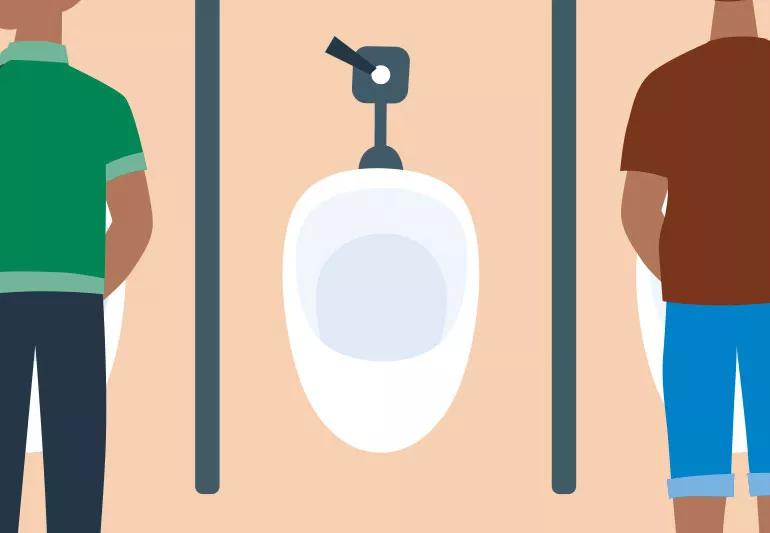Why you need to get it checked

Blood in your urine can be a startling sight, one that prompts concern over your health. While it doesn’t always mean something serious, several serious things can cause it. And that means you should contact your doctor right away.
Advertisement
Cleveland Clinic is a non-profit academic medical center. Advertising on our site helps support our mission. We do not endorse non-Cleveland Clinic products or services. Policy
It’s also important to understand what’s going on in your body. You may see a range of colors — from pink or slightly dark urine to bright red or cola-colored liquid. You may also see clots, which can come from your prostate, urethra, kidneys or ureters (tubes connecting your kidney to your bladder).
Blood in your urine may show up over a long time, come and go, or happen just once. And while sometimes your doctor might not find a direct cause, it’s important to consult them so they can rule out anything serious. To better understand the possible causes, we spoke to urologist Robert Abouassaly, MD.
While blood in your urine can happen to anyone, some issues specifically affect men more than women. This includes issues with the prostate and higher bladder and kidney cancer rates.
In 2022, the American Cancer Society estimates 50,000 new cases of kidney cancer in men and 28,710 in women. And for bladder cancer, there will be three times as many new cases in men (around 61,700) than in women (19,480).
While kidney and bladder cancers are the most serious of conditions that can cause blood in urine, there are other issues that you should be aware of, too.
The blood could be caused by a urinary tract infection (UTI). A UTI can occur when bacteria from outside of your body get into your urinary system — made up of your kidneys, ureters, bladder and urethra — causing inflammation and infection.
Advertisement
Bladder stones could also be the culprit. These stones usually form when urine is still left in your bladder after urination and the minerals crystalize, clumping together to form a stone. All of this can result in infections, issues with urination and, yes, bleeding.
While a UTI is treatable with antibiotics, bladder stones require more invasive procedures, including surgery, for removal.
Kidney stones, like bladder stones, can also be a cause of blood in your urine. These form when there isn’t enough urine to flush everything out of your urinary tract. Those leftover substances crystalize, forming stones.
While it’s possible to pass smaller kidney stones through urinating, they can still cause enough pain for your doctor to prescribe pain medication. For other circumstances, several surgical options can help break up the stone or remove it completely.
Kidney disease is another known cause of blood in the urine, and occurs when your kidneys are damaged, affecting their ability to filter your blood. If left untreated, the condition can evolve into chronic kidney disease. This can potentially lead to serious complications and treatment, including dialysis and organ transplants.
Blood in your urine can be a symptom of prostate cancer, one of the most common causes of cancer among men. While symptoms often don’t display in the early stages of prostate cancer, they can develop in later stages.
Less severe is an enlarged prostate, a condition that affects many men as they age. When your prostate becomes enlarged, it can squeeze your urethra, limiting the flow of urine out of your body. While blood is a common symptom of an enlarged prostate, it can develop if the condition is left untreated.
Some of the other causes of blood in your urine include:
It’s important to note, says Dr. Abouassaly, that while blood in your urine may be a symptom of cancer, it’s most often a sign of a noncancerous condition, like those mentioned above.
Yes, blood in your urine can go away if the cause is something like strenuous exercises or certain medications. However, because blood in your urine can be associated with serious issues, you should never let the condition go unaddressed by your healthcare provider.
You’ll want to contact your doctor right away if you see blood in your urine, particularly if it’s associated with:
It may not be a serious condition, but it’s still a warning sign of something wrong. And, says Dr. Abouassaly, if it’s serious, it needs to be addressed immediately. He adds, “Should it be bladder cancer or another serious condition, any delay in treatment greatly compromises treatment and cure rate.”
Advertisement

Sign up for our Health Essentials emails for expert guidance on nutrition, fitness, sleep, skin care and more.
Learn more about our editorial process.
Advertisement

A variety of factors can cause temporary or more lasting changes in penis length

An unexplained lump, swelling, discomfort or changes to your testicles shouldn’t be ignored

As the stalky vegetable breaks down, it leaves behind sulfuric byproducts that can make your pee stink

Arousal without orgasm can be uncomfortable, but it’s no reason to pressure sexual interactions

Most of the time, beeturia is a curiosity, not a concern

The list includes eating a healthier diet, managing your weight and reducing stress

Adjusting your diet to focus on plant-based, whole foods may improve erectile function

Here’s what you need to know about ED, which most men experience to some degree during their lives

Even small moments of time outdoors can help reduce stress, boost mood and restore a sense of calm

A correct prescription helps your eyes see clearly — but as natural changes occur, you may need stronger or different eyeglasses

Both are medical emergencies, but they are very distinct events with different causes